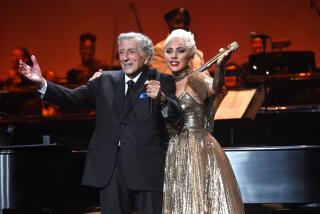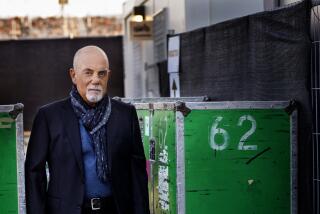RIDDLE: A MASTER AT HIS CRAFT
- Share via
It says something about the rising sophistication of the audience that Nelson Riddle’s death earlier this week was felt as a sharp, sad loss far beyond the ranks of professional musicians.
There have been occasional glimpses of him, headphones in place, baton in hand, during one of the countless television specials like the annual Variety Club Award shows on which he was conductor, yet he was hardly a visual celebrity. But Riddle and Gordon Jenkins, who died only a few months earlier, and a handful of others had, through the luster of their work, lifted the arranger-conductor from the obscurity of the fine print on record labels and jackets.
It was Frank Sinatra who more than any other personality led popular music around a sweeping corner from the age of the big bands to the age of the vocalists. The arrangers, crucial in the success of the bands, were not less needed by the singers.
Sinatra was the perfect symbol of the shift: a polite sitter at side stage, part of the bandleader’s supporting package (boy singer, girl singer, optional backup trio or quartet) in the Tommy Dorsey-Harry James days. Then he was at center stage, with an orchestra and conductor who were now the supporting package.
But from early on, it was part of Sinatra’s instinctive musical good taste that the arranger-conductors he chose to work with soon became, through the excellence and appropriateness of their backings, names to conjure with.
Axel Stordahl was the earliest, an association that began in 1940 when Sinatra was still with Dorsey. Stordahl did some of the classic sides, including Sinatra’s early theme, “Put Your Dreams Away,” and “Nancy.”
There were other early Sinatra chartists: Sy Oliver, who also went back to the Dorsey days and set jump tunes, Mitch Miller and Alec Wilder. (For his first outing as a conductor, Sinatra did a lovely album of Wilder songs for woodwinds.)
Riddle and Sinatra teamed up during the Capitol Years of his career, commencing in 1953 when, in a renewing turn of fortune, Sinatra also appeared in “From Here to Eternity” and, after some slow years, found a new magnitude of stardom.
Side for side, the songs Riddle arranged and conducted for Sinatra in the ‘50s are probably the most joyous, romantic and popular of all Sinatra’s recordings.
“I’ve Got the World on a String,” “A Foggy Day,” “It Was Just One of Those Things,” “All of Me” and many others announced a new Sinatra, no longer the thin, moony crooner of the beginnings but a salty man of the world who had taken his lumps and disappointments, but whose romantic optimism was still intact.
Riddle’s charts underscored it all--the up-tempo bite and verve of “I’m Gonna Sit Right Down and Write Myself a Letter,” say, the slightly indulgent melancholy of “The Wee Small Hours of the Morning,” the persisting defiant romanticism of almost everything. It was a marvelous mating of voice and instruments. The Riddle arrangements somehow embraced a sure and vigorous beat, with fiddles at their most enchanting and jazzy solo breaks that were like winks across a dance floor, as if to say that life was a very complicated emotional matter, and who’d have it any other way?
In the late ‘50s Sinatra also began a long working relationship with Gordon Jenkins, who’d had a great popular success with his tone poem “Manhattan Towers” and whose arrangements for the string sections have an unmatched sweeping beauty. When in the ‘70s Sinatra began to do rather introspective ballads with long melodic lines and lyrics that were almost recitatifs, the Jenkins backings set the mood impeccably.
There is hardly a fine arranger Sinatra hasn’t worked with--Billy May, Quincy Jones, Ernie Freeman, Neal Hefti, Robert Farnon, Claus Ogerman and, very often, Don Costa. But the association with Riddle was the most longstanding, and for all their achievements with other collaborators or in other areas, I have to suspect that their work together will look to history like the most significant, because they evoked from each other the best work of their best and ripest years.
It seemed to me, on casual acquaintance with Riddle and Jenkins, that even more than most good musicians, they lived with the inestimable satisfaction of doing the only thing they wanted to do, and with the knowledge that they were adding to the world’s store of pleasure and beauty.
More to Read
The biggest entertainment stories
Get our big stories about Hollywood, film, television, music, arts, culture and more right in your inbox as soon as they publish.
You may occasionally receive promotional content from the Los Angeles Times.










